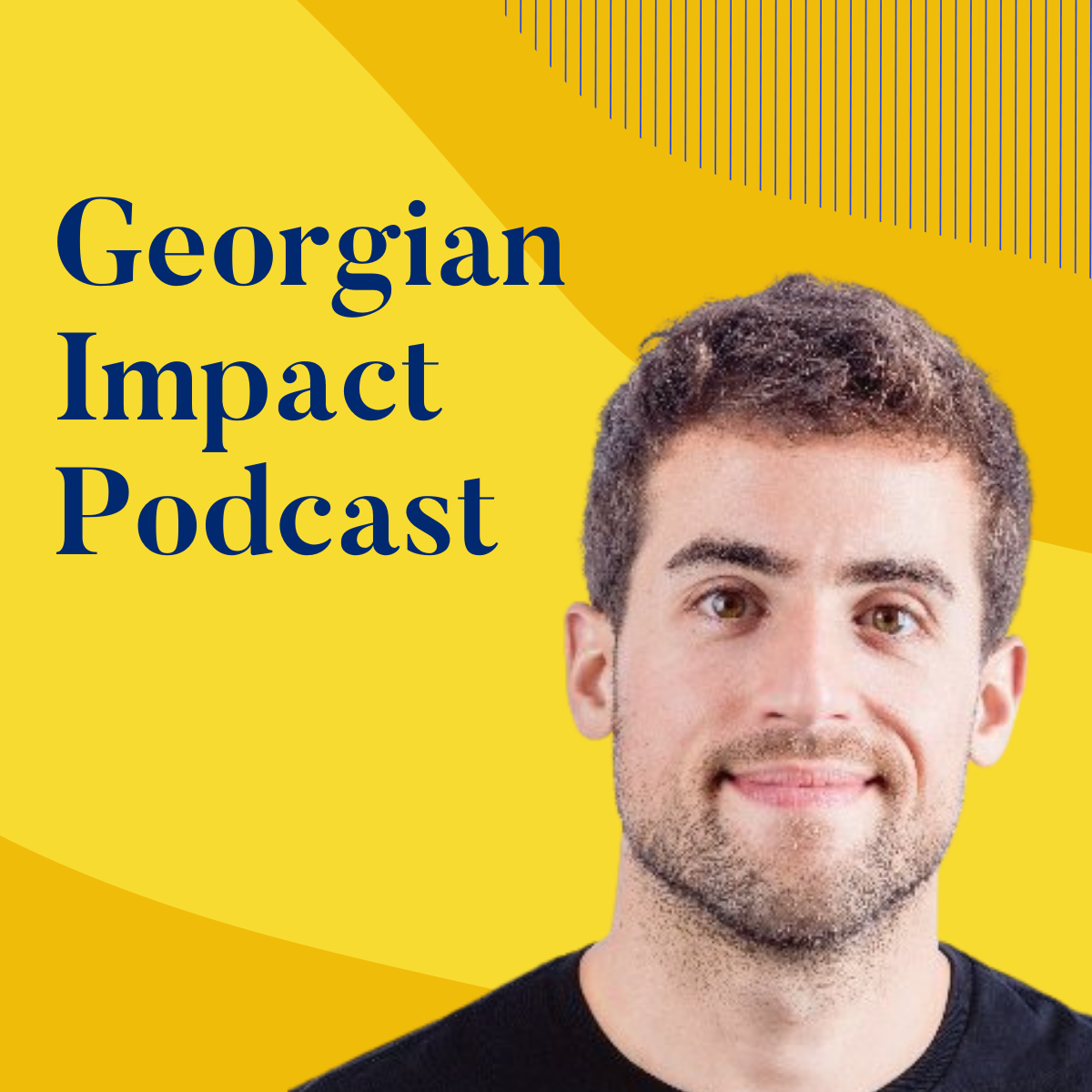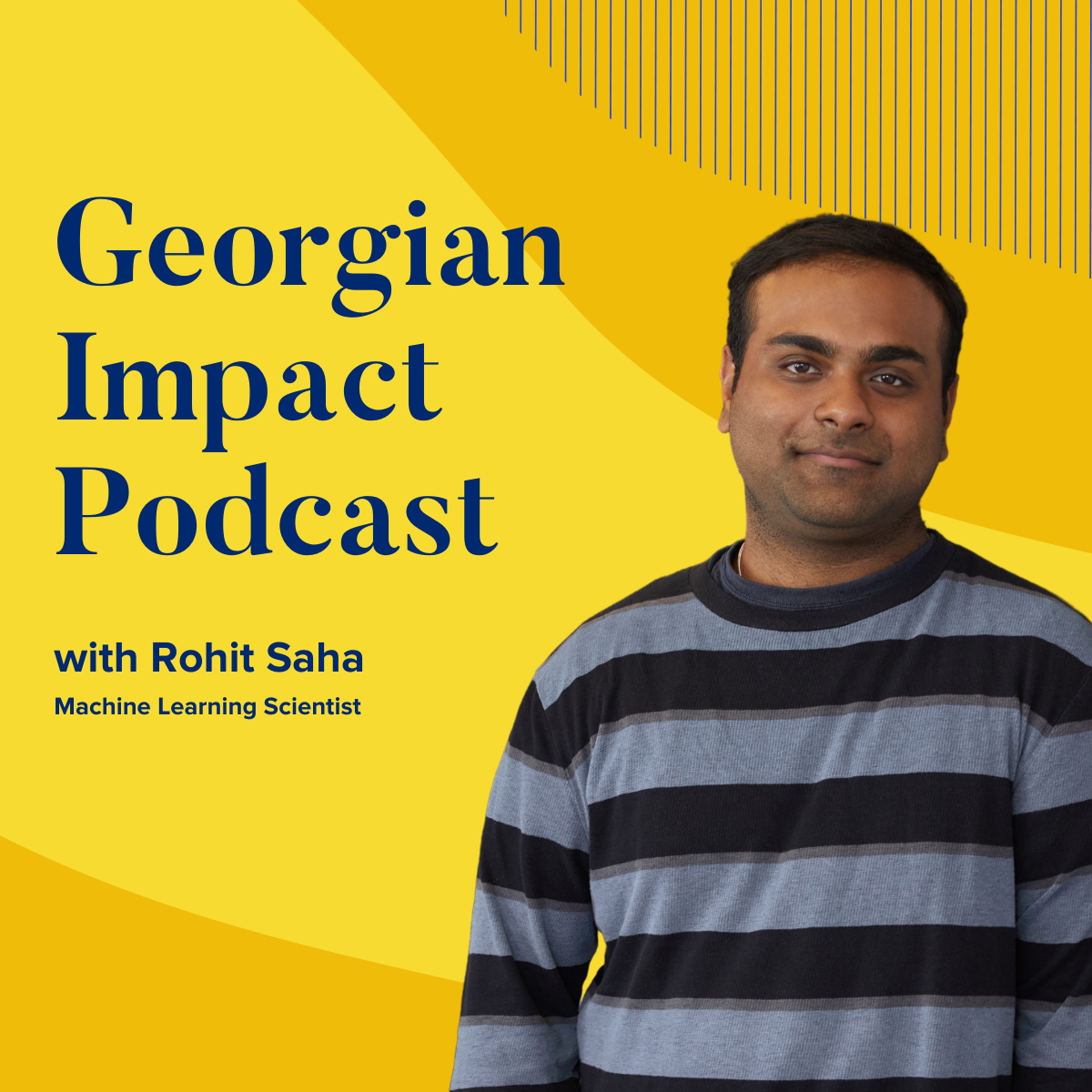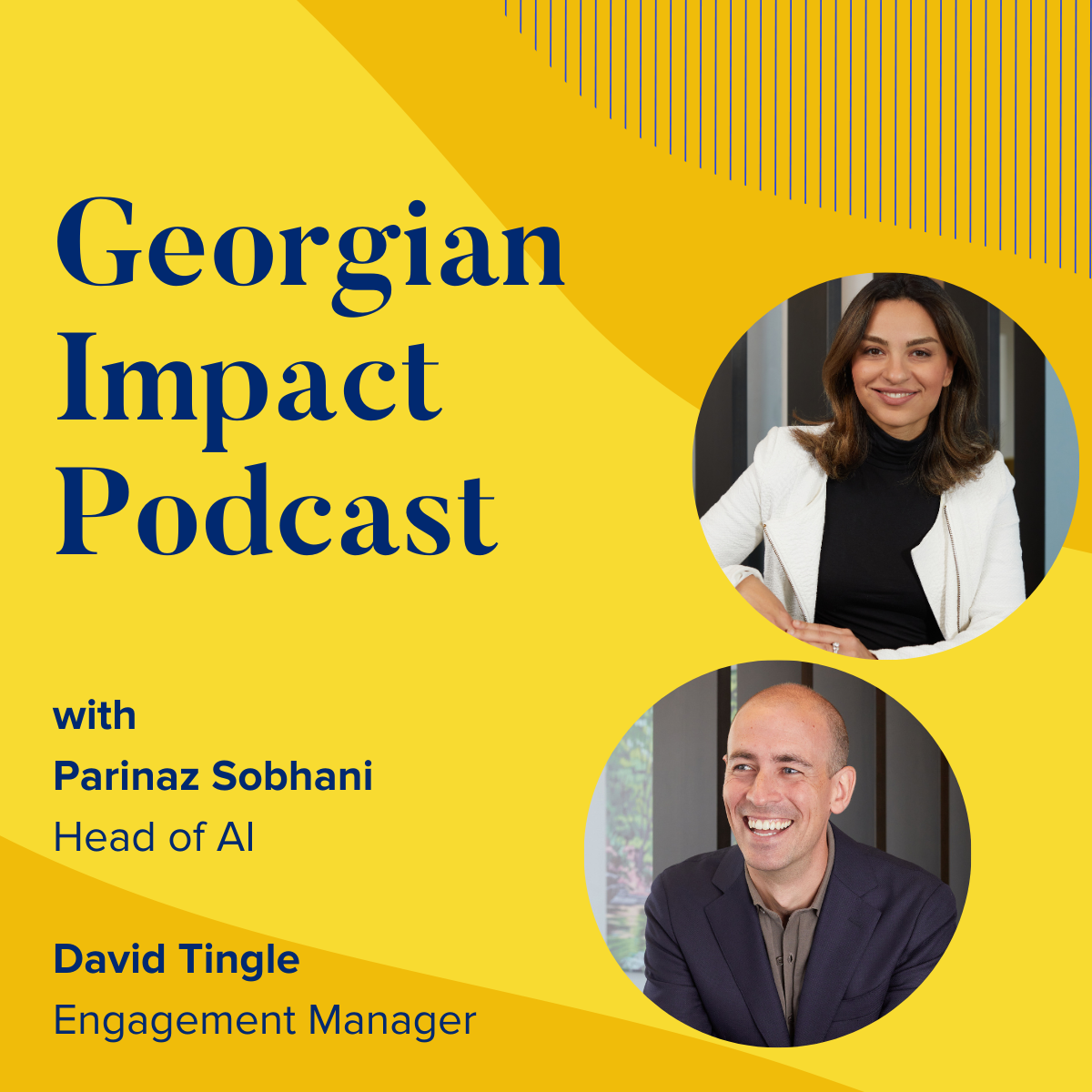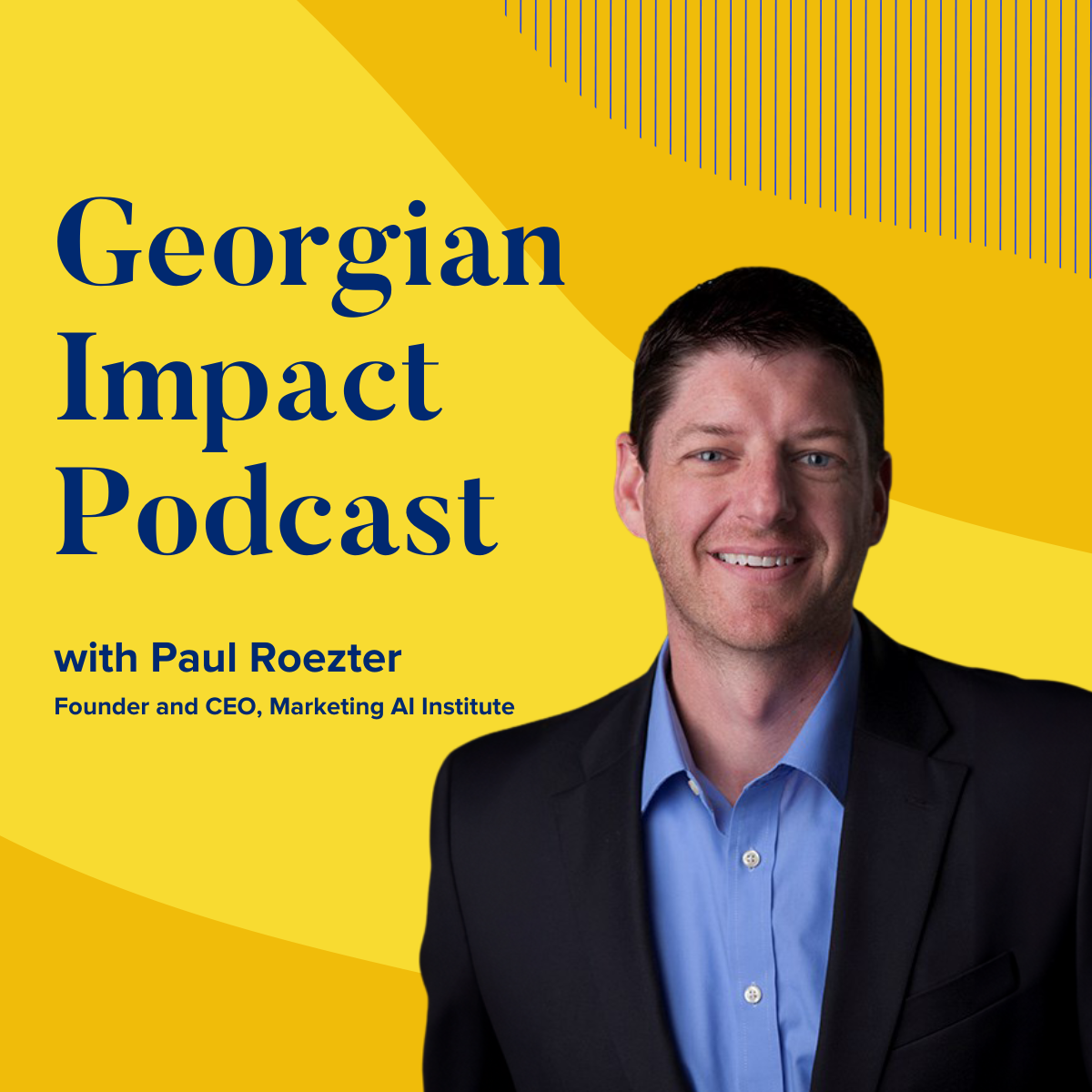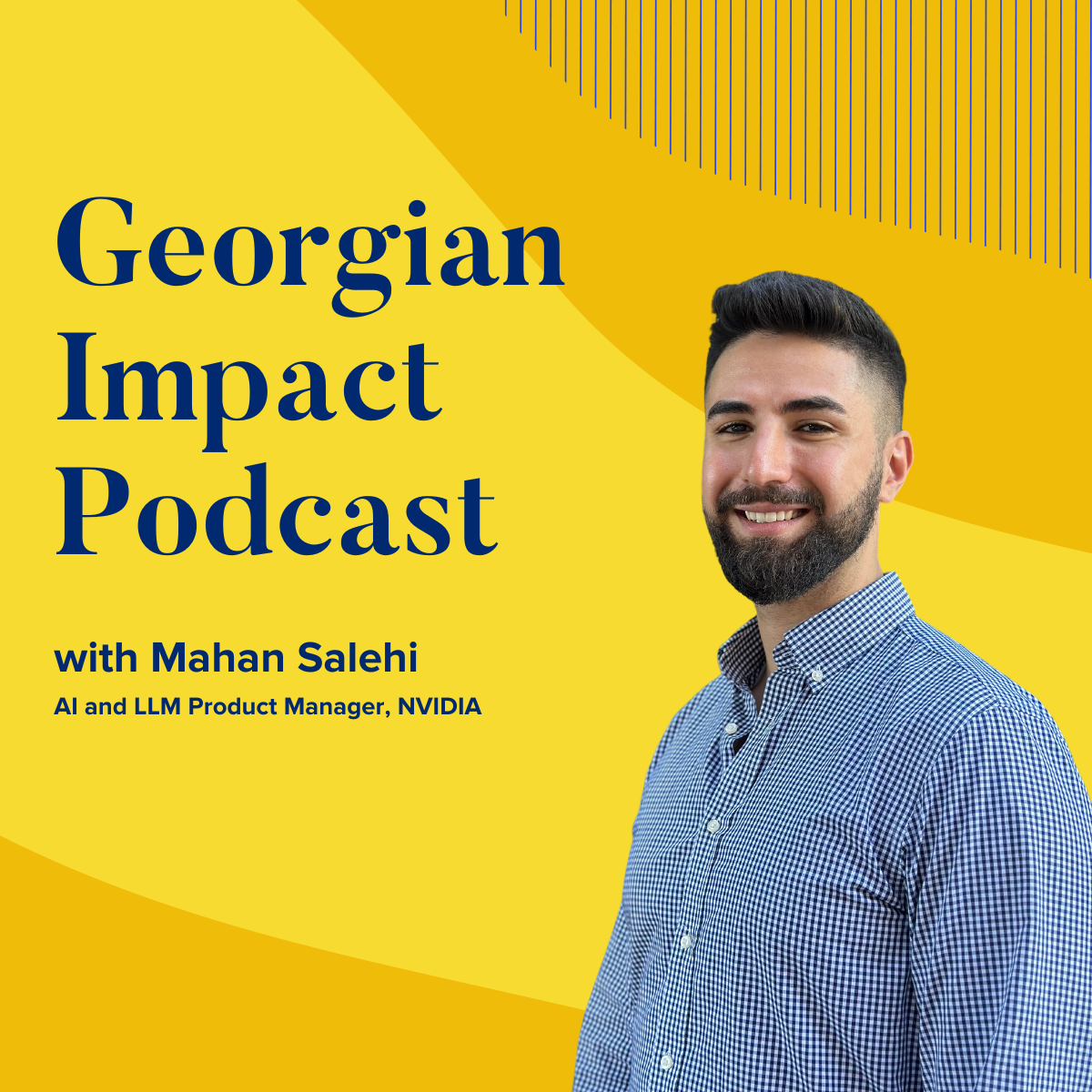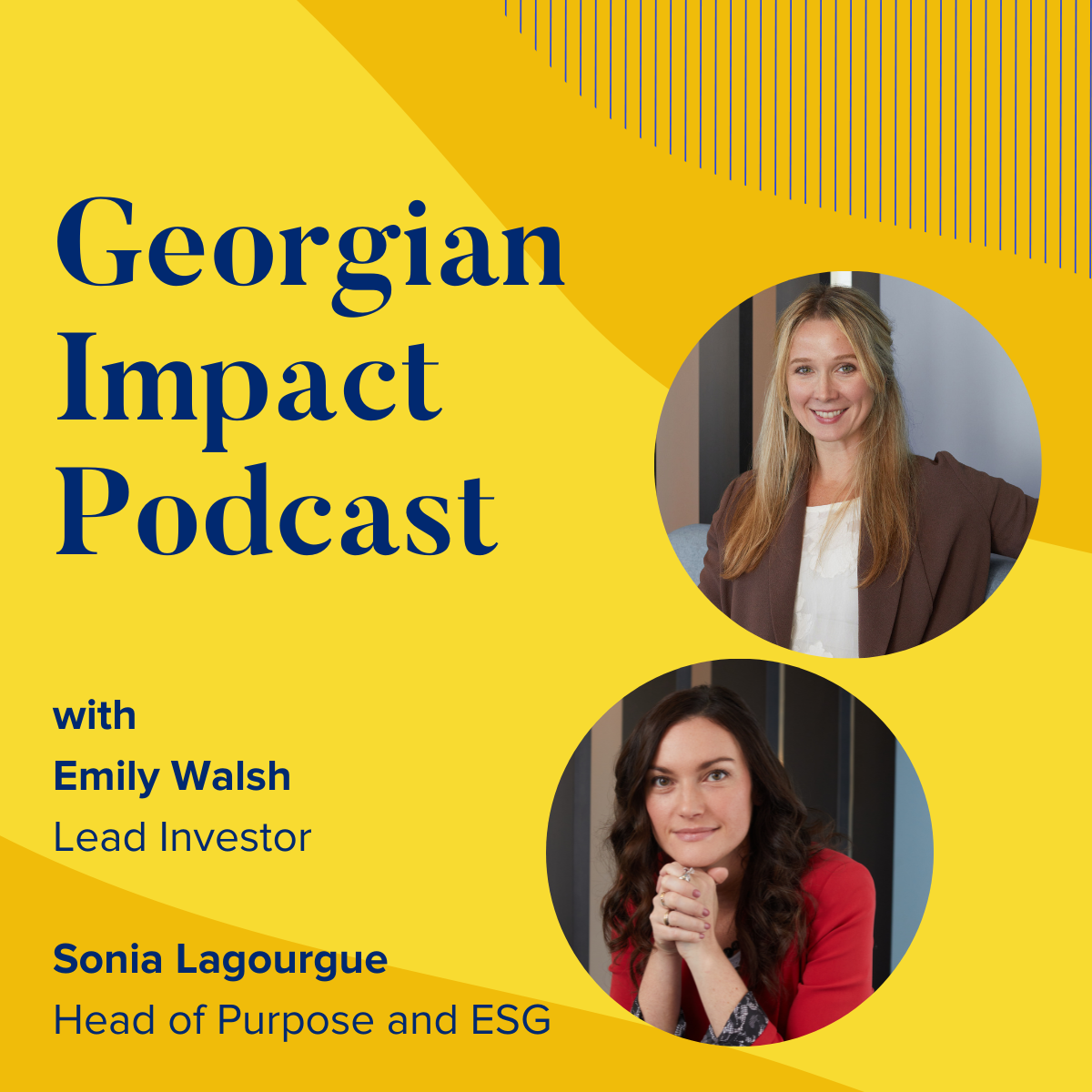How to Build a Healthy Internet with OpenWeb's Nadav Shoval
- 0.5
- 1
- 1.25
- 1.5
- 1.75
- 2
Jon Prial: Trolls or no trolls, that is the question. And guess what? This could be in your control. Today we'll be talking with Nadav Shoval, CEO of OpenWeb. OpenWeb's mission is to help build a healthier, open internet, and it starts with improving conversations. But this is more than my troll alert. With some of the big providers out there collecting gobs of data, or inhibiting the collection of gobs of data, or regulations coming down the pike, Nadav and I are going to be talking about something that you're going to hear a lot more about, first- party data. First- party data is relevant to publishers, advertisers, and yes, consumers. Maybe brighter days lie ahead. I'm Jon Prial, and welcome to Georgian's Impact Podcast. Nadav, welcome.
Nadav Shoval: Thank you. Great to be here.
Jon Prial: Great to have you here. So as we work through this complex world of data, data collection and so much more, I'd like to kind of step up at a little higher level before we dig in. I'd like to get your view of what you think trust means.
Nadav Shoval: So trust, I think these days is one of the most undervalued thing happening on the internet. If you look at big tech, and if you look at regulators and you look at journalism, and the work of journalism around all what's happening in the world right now, I think that a lot of companies don't focus enough about long- term trust with their users. I think it, for us, as a mission- driven company, one of the things that we realize is that it's not enough to do what we do. In order for us to get the validation from the market, we have to build real trust with the end users, with the brands, with the publishers, and so far. And I think if you look now at what happening with Meta, I think one of their biggest issues is exactly that, that people don't trust them. And I think what's harming them significantly is the fact that regulators and public consensus is going hard against them.
Jon Prial: I like that you just talked about this whole ecosystem of people that are involved in this world of trust. I kind of often think it's just the end user, and you mentioned Meta losing trust, but it really is more than that. Talk to me a little more about, we're going to go deeper into this, about say, publishers and those that believe they have customers, but they're getting kind of cut out by these intermediaries.
Nadav Shoval: Well, with big tech and with users and in general, it's like, when it comes to first-party data, users should own their own data. And I feel that for many, many years, people kind of almost gave away their privacy in exchange to value. And the value could be a product, it could be content, and so far. And I think what we're all starting to understand is that we still want to get the same value exchange, but we just want transparency around it. So I don't think people necessarily mind to exchange data for value, but they want to know what's happening with the data, what's being used with it, who is using it, where it's been stored? And they want accessibility to their first- party data. So I think trust and transparency goes hand in hand. And this is where I think things kind of started to go sideways.
Jon Prial: And this is transparency about the data. There's other conversations, which we won't get into about transparency, about some underlying algorithms, although I do want to talk to you about some ML models. But it's interesting, has the paradigm changed, where it used to be, the model of every company should get everything they can, every piece of data from every source they can, but you do talk about first- party data. So talk to me a little more about how things might be changing now.
Nadav Shoval: Well, I think it's a lot of change, right? With the change of third- party cookies, almost going away, not many devices and browsers are deprecating the third- party cookies, which is an amazing thing for consumers. And I think first- party data is just the beginning of the change, with blockchain and Web 3. 0, I almost believe we're moving from... if Web 1. 0 to 2. 0 was about social, I think now we're moving to a direction when it's about moving almost from the cloud, with one company holding all their data, to users owning their ID and everything about them. So I think there's a huge changing happening around the world and in our industry. And it's all about privacy and transparency and accessibility to first- party data.
Jon Prial: And it's interesting because you're talking about users kind of owning their, almost decentralization of ID. But now when you're talking about ID, it's not just ID, who I am, it's ID, all kinds of things about me. Perhaps my preferences to buy things or that companies are inferring. And please be transparent and tell me what you're inferring about me. Or let me tell you what I want you to know about me, right? Are we going to get to that level of control?
Nadav Shoval: Absolutely. I think, if you really look back at the beginning of Facebook and Google, there was zero transparency about what's happening with the data. Now it's, you can start getting into that, but it's pretty complicated. If you go to your Google settings or Facebook settings, eventually you can find what they know about you. FYI, you might be terrified. I always like to say, show me your Google ads and I'll tell you who you are. But yes, I think it is the direction. I think that hopefully, soon than later, good tech companies will allow users to have full ownership over their data, their preferences, their history and yes, their personal identifier, known as user ID.
Jon Prial: Nice. So let's talk about publishers and advertisers. So we'll start with advertisers. Kind of my view is, of course, and this is what we've been talking about, we're moving a little bit away, hopefully, particularly with this Meta issue, with targeted advertising becoming harder. So what happens to advertisers? Are campaigns going to change? And of course get me to, what might be considered conversational based advertising. Tell me what I'm talking about and now you can learn more about me, just like you can learn more about me from what I search for, for example.
Nadav Shoval: I think that online advertising was this world when brands wanted to reach consumers and publishers, content creators, tried to do this value exchange of people coming to their websites, consume content, and in exchange, they monetize against it. The issue was is that publishers did not have first- party data relationship with their audience, so they had to bring poor advertising capabilities to their website. And that's why you see that the open web, the internet, is having this quite of bad user experience, bad ads, but you inaudible poor performance, and so far. And I think where it's shifting right now is, those brands and publishers are waking up and say, oh, for many, many years, we gave up all our users to social media. People came to New York Times to read the content, but then they went to Facebook to talk about it, or they went to Twitter. And now this, when cookies are gone, they started to realize that it's all about the relationship. They have to build this first- party relationship with their audience in order to flourish and allow advertisers to create high quality campaigns, like social media, on their websites.
Jon Prial: This is interesting. So let's stay with, I was going to pick CNN, but let's stay with the New York Times. So New York Times writes articles, and you're right, there's not a lot of interaction and comments. And more often than not, they might shut comments down. It's not a inviting site to go chat. And I hadn't thought about it, yeah, they go to Facebook to talk about an issue and they should be staying on the Times' website to focus and talk about that issue. At the same time, we have an advertiser. Ford has an electric truck. How do they come together?
Nadav Shoval: If Ford wants to acquire an audience, they have a lot of options. They could do it on YouTube, on Facebook and TikTok, et cetera. If they would like to target the open web, they need the ability to create an audience, to target them. So they would like to know people that read about these things and talk about these type of things. I think so far, the way they've done it, was with third- party cookies. So people are going to drop a cookie on your browser, they're going to see your browsing history, and based on that, they will create a campaign. Now, when all that is gone, they got to give you some level of value to get your consent.
Jon Prial: Mm hmm( affirmative).
Nadav Shoval: So what I love about this change is, there is a much more transparent and clear value exchange. So in order for them to allow, for New York Times to allow Ford to target you, they need you to give them a consent. And for them to get a consent from you, they must bring you value. And that's why the internet is changing right now. And that's why they care so much about value exchange and a first- party data relationship with the audience, which mean they want you to stay on their assets, they want you to engage, to provide consent, so then afterwards they can bring the brand and the advertisers to target against it.
Jon Prial: So if the New York Times, I'm really learning. This is so interesting, it is so different from cookies and somebody inferring that I might want to buy an electric truck. But if there's an article about electric vehicles and trucks versus SUVs, or whatever, the Times will have that first- party data with me now. Right, the Times now owns my data, not Facebook, not Google, the Times has it. And they could turn to their advertisers and say to Ford, would you like to play? Is that how it works?
Nadav Shoval: There are different ways to do that. Some of them are more automated, as known as like programmatically and some of them are more like direct. But in the end of the day, the same basic way of doing it, it's about getting unique first- party data from users that are willing to exchange this value, to provide email, to do that in exchange for something, and then create a segment of audience and target against them. So basically, yes.
Jon Prial: But they do... That's interesting because they're now doing the segmentation with my permission.
Nadav Shoval: Yes.
Jon Prial: So they're learning about me, they have my permission. And I've always heard people say, look, I'll take, I don't mind people spying me because I'm getting stuff I want, but I would much prefer to give you permission and say, here's what I want you to know about me. And now you can target me with electric vehicle information.
Nadav Shoval: Exactly. It's almost eliminate middle mans, which are, in some cases, just bought your data without you to know. And it also eliminate some of the negative effect of big tech manipulating your data, reselling them or buying your credit card information, for example. So I really believed we are going into a much more transparent internet and I think it's a great thing for consumers.
Jon Prial: I'm going to create your value proposition, which I'm sure you've written many places, but I'm just, just as part of this conversation, here's where I'm going. The disintermediation of the publisher is going away. They don't need to go through Facebook. They're going to be able to work directly with consumers and do better. And the advertisers, I would find more value because it's a much clearer description of the value, as people opt into this world, as opposed to everybody knows that, I shouldn't say everybody know, but there is obviously tremendous discussion about what percentage of ad fraud is out there, and bots are out there. That all goes away now. The advertiser knows, through its relationship with the publisher, and the publisher's relationship with me, it's much more direct. We're getting rid of its layers, of not only just middlemen or middle people, but we're actually getting rid of layers of obfuscation, so to speak. It's clarity, from beginning to end.
Nadav Shoval: Exactly.
Jon Prial: I'll take it, I'll take it. No charge for that. So let's get into really OpenWeb and conversations. I'm fascinated by this. So talk to me more about, what's a healthy conversation and why conversations matter to you at OpenWeb?
Nadav Shoval: So conversation's really important for me is because, this is almost like the story of my life. As a kid I was diagnosed with disease called Kawasaki. While I'm healthy, it harmed my fine motor skills, and until today it's really hard for me to write down with a pencil. So I got computer in the age of six or seven. I started to program and I was building chat, messaging, forums and stuff like that. So for me online communities and online conversation is a huge part of my life. I found, around seven or eight years ago, that online conversation has change, a lot has change. I think like maybe like 15 or 20 years ago, it was just more, almost naive, but online conversations where significantly better. And now it's getting to the point when there is so much personal attacks, racism, hate speech, bullying and so many different type of activities, which obviously they've been there, but not at this scale. The open web, the internet, big tech, doesn't matter where you go, Reddit, Twitter, Facebook became very, very toxic. And we feel that in the world when people want to exchange their ideas and want to share information and create communities online, it's a beautiful thing, and it's an important thing for society, but it doesn't have to be as toxic. It doesn't have to be. We don't have to create algorithms that promote extreme. We don't have to reward experience when people feeling that they have to find a side. It's okay to disagree, it's good to have debates. It doesn't have to go to personal attacks, towards an individual, towards groups, minorities, and so far. I just think that the internet is going to a place which is a little bit negative in the past few years. And I think we saw it during the pandemic as well, where we all want to engage online and just online conversation, always like me against you and you against us. And we just feel there is a better way to do that. So that's my long answer to you. I really feel conversation matters. It's really important for me on a personal level because almost it took the story of my life. And I just find that big tech are not doing enough to make it better.
Jon Prial: So this requires moderation, maybe human moderation, and/ or tech moderation. So how do you help? How do you do this?
Nadav Shoval: So we started by creating guidelines, and we have what we call global standards. Global standards, which we design and built together with academia and different experts, of where is the line between moderation and censorship? And after doing that, and it's on our website, you could see it there. But once we define where is the line and what are we allowing and what we are not allowing, we started to build different technologies and algorithms. And the core, OpenWeb is a IANL company. We build different algorithms to detect different activities. When we say, for example, racism, unfortunately there's different type of racism. When we say toxicity, there are so many ways to be toxic. When we say attack, there are so many attacks. So for each one of these behaviors, we have different algorithms to detect it, automatically, at scale. For example, during 2020, we realized that there was a massive increase of what we call, white supremacy activity, across the internet. So we build an algorithm to detect white supremacy, in our system automatically, and so far, and so far. It could be about attack of a user, it could be about shaming, it could be about many different things, bullying. We believe there is a way to automate it in a scalable way that allow people to have much better conversations. So we started with IANL. The second thing is about rewards. It's almost like, the carrot and the stick. We believe that most people are good, so we created incentive mechanism to get people to be more thoughtful and civil to each other.
Jon Prial: And I've never thought about the carrot at all. So tell me more about that. That's really neat.
Nadav Shoval: So when people are talking in the system, we try to reward them. So let's say, you write something that might not be aligned with the guidelines. We might just tell you in real time, hey, are you sure you want to send it? The community might not allow that. And we made a resource with Google and Wall Street Journal, and I think more than 30% of the people that get this nudge, change their opinion, and the comment will go through, just for example, without it go to the algorithms. Also, we have different type of reward systems and deep gamifications with the actual value. So the more civil, the more thoughtful you are and the more value you bring to others, the more exposure you get.
Jon Prial: So is it also fair to say the more I participate and chat, the more you learn about me, which isn't necessarily a bad thing, but I'm curious? Is that part of the first- party data you're collecting about me?
Nadav Shoval: It's part of that, but it's not about just knowing more about you. We call it reputation.
Jon Prial: Mm hmm(affirmative).
Nadav Shoval: So we want to make sure that you are trustworthy in the system. And we want to know whether you have knowledge about what you just read, because we find also on Twitter, a lot of people just like sharing an article without knowing the content. So we actually want to know that you read the article, that you understand the topic, before giving an advice for someone else, just for example. So the credibility of the user in the system is way more important than their social footprint.
Jon Prial: Mm.
Nadav Shoval: Like how many followers they have. So it's all about, do we trust you?
Jon Prial: You're going to kill my joke, but my joke is, hey, I'm going to go do my own scientific research. Let me go read the comment section of something. But you're going to fix that.
Nadav Shoval: Yeah, hopefully.
Jon Prial: You've got that, right? Let me ask a question about comments and have you tell me if they're different. Comments are different than conversations, or do you view them as the same?
Nadav Shoval: I like this question a lot, actually. So I feel that the legacy commenting systems, it was about comments, right?
Jon Prial: Yep.
Nadav Shoval: Someone would read something or find a product and through a review or read an article or a video and just like, say whatever they have to say. I think what we are trying to do, and hopefully we're doing a decent job, is to turn this into conversations.
Jon Prial: I love it.
Nadav Shoval: When comment is me just saying something, conversation is a group of people sharing opinions. They might disagree with each other, but they're having a real conversation.
Jon Prial: I love that evolution. It's interesting, I was just reading a piece in the New York Times. A reporter, with her husband's permission, by the way, tracked the living heck out of him. She used Air Tags, tiles, an expensive GPS system, all kinds of issuers of what was warned as being illegal and the sophistication of some of these things. But at the end, you could buy some of this stuff on an e- commerce site, and right there in the comments were, hey, you want to track your spouse? You could just do this. And it would be much better to turn that into a conversation. And maybe even have the, you talk about the advertisers or the publishers participating in that dialogue. Do you see that, do you see others helping turn that comment into a conversation by, not just having people, but having entities like publishers and advertisers, engaging?
Nadav Shoval: Just before I answer, I'm wondering if your wife knows if you read this article?
Jon Prial: Not yet. Probably come up at dinner.
Nadav Shoval: So to answer your question, I think that this is the point. Can we allow trustworthy storytellers, publishers, to host meaningful conversations? Because we almost feel that conversation on social media, in many cases, is going to extremes and we feel there is a way to create much healthier dialogue on their websites, on their apps, et cetera. By the way, sometimes, together with the journalist, with the editors, et cetera, which we also will provide them information for potential follow- up investigations in some cases, and stuff like that. So, yes, definitely.
Jon Prial: So let's open the podcast, talking about trolls. There's an element of people identifying themselves or hiding themselves behind some dumb handle. Is there a difference between being a registered user and kind of being anonymous?
Nadav Shoval: Yeah, of course there is. And we believe that over time, it's not just about anonymous or being registered. It's about allowing people to represent whoever they want to be, and it could be different avatars or it could be any different thing. But we believe that there is something about being authentic and being accountable for what you say. And therefore we believe it's really important for people to own their identity. And I think a big reason why people in the past didn't want to do that, they were afraid of being blamed. They were afraid of being attacked and hopefully, OpenWeb can be part of the solution for that.
Jon Prial: Nice. So I guess I want to understand a little more about the challenge of moderation. Like you mentioned, something comes up and you're going to add that to the system. So there are humans that are actually playing a role in this. I'm sure, over time, you're going to want to have a smaller percentage of humans or, as the volume of issues go up, maybe they can handle more issues. How do you see the balance of ML versus people?
Nadav Shoval: Let me start by saying that, I don't know if you ever moderated? I do, it's not easy. It's a really hard job. And by the way, you are exposed to some things which are pretty bad. There was a lot of research about Facebook moderators all over the world.
Jon Prial: Yeah.
Nadav Shoval: And unfortunate, PTSD, just from moderating. So as a mission- driven company, we believe that moderation should be mostly done using machine learning algorithms. We always want to provide the ability for a human to provide additional input, because there are things that even I would have a debate, whether or not they should be moderated, yes or no. There's always this borderline when you want to provide some input, but I think that the vast majority of the current online should, or I would say, must, be automated. And this is what we do and I think this is our biggest differentiation in the marketplace. We spend a lot of effort creating the best in class moderation system. And we always want to allow the people, the users in the community, to provide their input. And we call it like a crowdsource, which is very close to Wikipedia and stuff like that.
Jon Prial: Nice. The evolution of Wikipedia from how many years ago, telling every high school kid, don't go to Wikipedia, because you don't know what's there, to the system they built in place, with moderators and validators and requiring sourcing, it's a great evolution. So if you're hanging onto that Wikipedia model, I think that's tremendous. That's a great model.
Nadav Shoval: Yeah. I think they done a tremendous job for the internet to prove a point that people could be trustworthy, if you're building the right mechanism in place.
Jon Prial: Beautiful. In terms of what you would tell your advertisers and/ or publishers, what can you measure for them? What can you help deliver to them? I think about in my old, when I put my marketing hat on, it's not clicks. I want to see people dwelling on my content, for example. So dwell time might matter to me. Page views might matter to somebody else. What kind of information can you give to both your advertisers and publishers, to kind of show that you're working really well for them?
Nadav Shoval: I think that it's so kind of basic almost, so I'm sorry if it wants it too fancy, but users. We want to stop looking at paid views and talk about CPMs and talk about impressions. We want to talk about real, registered, active users and we want to talk about actual value exchange, which mean people that are actually wanted to be part of the community and wanted to engage. When we look at the lifetime value, the LTV, of the community on publishers vs non- community members, the numbers are just astonishing. It could be like 17, 20 times more. So when we go to brands, we tell them, now you have the ability to engage with the best users of the open web, and with the most passionate and engaged audience, but actually a registered engaged audience and not a cookie. And I think for publishers is even better because we tell them from now on, you don't have to rely on Facebook. You can build your own community and have the first- party data relationship with your audience.
Jon Prial: So it's really about, I don't want 10, 000, I want the right 5, 000, or maybe these numbers don't make sense, but you want to give me, the publisher, and me, the right set of customers that I can spend a lifetime with, so to speak.
Nadav Shoval: Exactly. It's about making it more sustainable and because a big part of our vision is to make the open web, not our company, the open internet, I mean the term, to become much more sustainable and less relying on big tech. Because we believe that both eCommerce, brands, publishers, they're the vast majority part of the internet. If you look at Comscore, Similarweb, the internet is very large and most of it is not big tech. So can we create a world when both brands, eCommerce, publishers, et cetera, can coexist commercially, sustainably, without relying on Google or Facebook and Amazon? I believe that, yes.
Jon Prial: Nice. And I see, it is the word churn, although when I think of churn, I think people that were using a product and churning it out, churning out, and that's a bad thing. And now I've got people engaging with me as a publisher, churn matters. It's a slightly different view of churn, but it's still, you want to obviously keep churn down. It's still churn, it's just a slightly different view of churn, I guess.
Nadav Shoval: Exactly. But I think more than anything it's about publishers always had relationship directly with their audience, right? Back in the days, when you get the print edition, for example, you would be subscribed and you would get the actual newspaper to your home. So they have this direct relationship with you. And when they pivot to digital, they started to more and more rely on Google, more and more rely on Facebook, more and more rely on Reddit and Twitter, to have the relationship with their audience. And they became less and less independent.
Jon Prial: That's right. So we have to get rid of this intermediate, go back to, put the paper in front of me, the physical paper, and the little blue, New York Times, and the little blue bag had ads in it. We still want to be at that point, but what we're going to put in between the article and an ad, because obviously we can do things smarter in this internet world, you're going to put some conversations in the middle and some user knowledge in the middle of this, and then Times can provide more value to me and provide more value to the advertisers. To my Ford truck, wherever we're going to go.
Nadav Shoval: Exactly.
Jon Prial: So let's just wrap on this a little bit since we sort of drifted, we had a nice, opened a little bit identity. We did trust, I'd like to get a little bit of privacy, and of course, we've been swirling around this sad, toxic, and today culture. So to kind of close on where we are with all this stuff, what do you think's in important in this new world? And you talked about knowing who the users are, and I know there's an open web registered user, so kind of wrap it all up for me as to where you think all this is going to go.
Nadav Shoval: Here's my view. I think that in five years from now, the internet will be a very different place. I think people will hold their data. I think content creators will have the relationship with their audience, and I think that social media will still have an enormous impact on our life, but less so. I believe that brands and e- commerce sites will have a much more diverse user acquisition channels. And I think the open web will become a much more civil, thoughtful, healthier place because we saw some, a lot of bad things happening in society in the past three years. And I'm not here to be a judge, but fact- based, I think that many of them happened due to different manipulations of social media. And I think that everybody wake up and understand, it shouldn't be like that. And not only regulators, users, people. So five years from now, a distributed, healthy open internet, no more third- party cookies, much more transparency about first- party data, hopefully better regulations around first- party data and less manipulations of what we read. And you know what? I hope there's less fake news as well.
Speaker 3: Excellent. Nadav Shoval, CEO of OpenWeb, thank you so much for taking the time to be with us today. This is just a great conversation.
Nadav Shoval: Thank you so much.
DESCRIPTION
Trolls or no trolls that is the question, and guess what? This could be in your control. In this episode of the Georgian Impact Podcast, we talk with Nadav Shoval CEO of OpenWeb. OpenWeb’s mission is to build a healthier open internet, starting with improving conversations.
You’ll Hear About:
● What trust means to Nadav.
● The need for transparency when dealing with data.
● Users taking back control of their data, preferences and ID.
● How advertising needs to change and adapt.
● Why conversations matter to Nadav and OpenWeb.
● Where is the line between moderation and censorship?
● How OpenWeb looks to encourage positive online interactions.
● Evolving comments into conversations.
● The balance of ML vs. people when it comes to moderation.
● How OpenWeb demonstrates value to advertisers and publishers
Today's Host
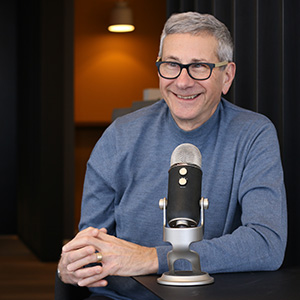
Jon Prial

Jessica Galang
Today's Guests

